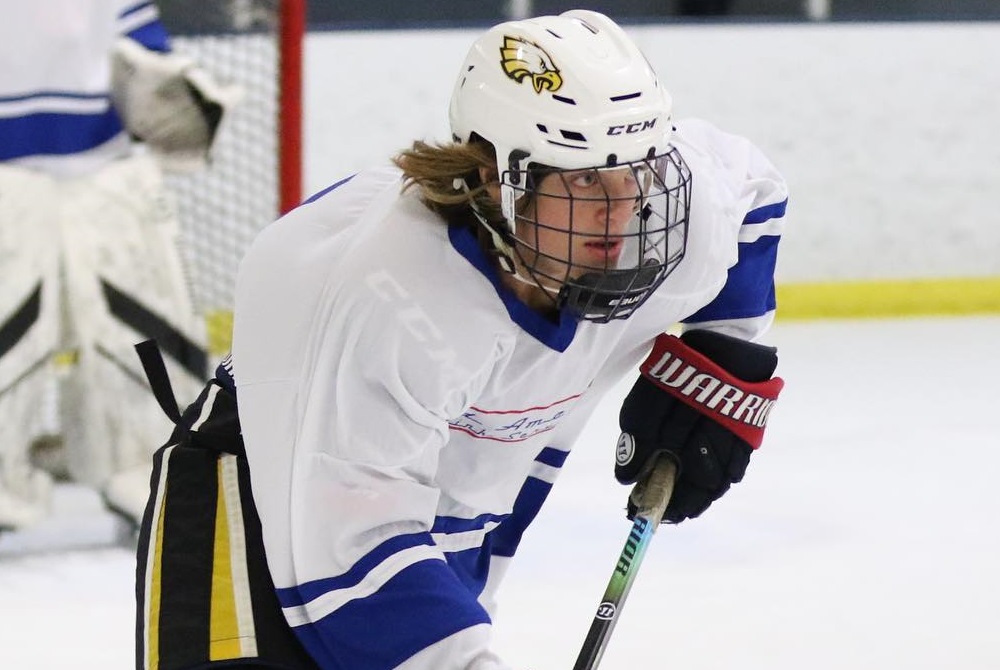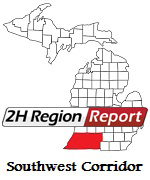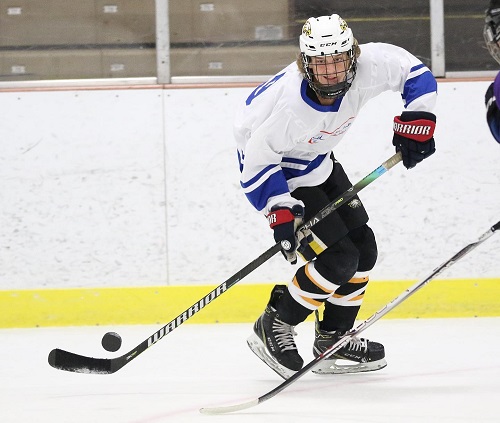
Next Bootland Also Finds Home on Ice, Set to Help Kalamazoo Eagles Soar
By
Pam Shebest
Special for MHSAA.com
November 16, 2021
PARCHMENT — After being pelted by pucks when he was very young, Breckyn Bootland knew for sure he never wanted to become a hockey goalie.
 Instead, the Parchment junior focused on puck handling and is making his mark as a forward for the Kalamazoo Eagles cooperative team in the Southwest Michigan High School Hockey League.
Instead, the Parchment junior focused on puck handling and is making his mark as a forward for the Kalamazoo Eagles cooperative team in the Southwest Michigan High School Hockey League.
If the name Bootland sounds familiar, it is because his dad, Nick Bootland, has been head coach of the ECHL Kalamazoo Wings for the last 13 years.
One could say hockey is in Bootland’s genes. Besides his father, his uncle Darryl Bootland also played professional hockey.
The “puck pelting” happened during youth hockey, where the players had a chance to experience all positions.
His dad also unleashed a few shots at his son, who was wearing goalie pads, in the backyard to give him a taste of the position he was hoping he would not like.
The young Bootland said goalie was never an option. Besides not liking people to shoot pucks at him, “I always liked scoring.”
That practice has paid off.
He was named team Rookie of the Year last year, recording six goals and three assists in 12 regular-season games during the COVID-shortened season.
After playing youth and then travel hockey, Bootland opted for high school hockey – but the transition was not as easy as he expected.
In travel, “I was just playing against guys my age, so when I stepped on the ice and saw guys that were way bigger than me, it was definitely a shock,” he said.
‘I knew guys would be bigger, but just to be out there with those guys was different. Knowing some of the guys out there helps out from a maturity standpoint because you have guys keeping you in line.”
He also had his dad available to do the same.
 With the K-Wings organization opting to sit out the 2020-21 ECHL season because of COVID protocol, Eagles head coach Matt Kruzich asked Nick Bootland if he would be comfortable stepping in as his assistant coach
With the K-Wings organization opting to sit out the 2020-21 ECHL season because of COVID protocol, Eagles head coach Matt Kruzich asked Nick Bootland if he would be comfortable stepping in as his assistant coach
“He’s a professional hockey coach who has a full-time job,” Kruzich said. “He was invaluable with the amount of knowledge and experience he brings and the professional approach he has plus the depth of knowledge and the ability to convey that to young kids.
“When he speaks, they listen.”
After making sure his son was okay with the arrangement, Bootland agreed, giving father and son a chance to bond as they never had before.
Because of the K-Wings’ schedule, Bootland said he saw maybe one or two tournaments his son played throughout his travel hockey years.
“I literally watched more hockey and was around him and was on the ice with him (last year), than ever before,” Nick Bootland said.
“We practiced for three or four weeks before (the Eagles) were allowed to play any games, and then we practiced and played games. We’d travel in the car together. To do all those things was fantastic.”
Before that, “It always was me and my mom (Christine) going on trips to tournaments, and we’d always carpool with other people, which helped me get closer to my teammates,” Breckyn Bootland said.
This year, with the K-Wings back on the ice, the junior will start the season without his dad in the rink.
The Eagles’ first game is Nov. 24, and the K-Wings play a home game that day.
There are upsides and downsides to playing a sport his dad coaches, the junior said.
“I guess he knows what he’s talking about,” he said, laughing. “When I have a bad game, he doesn’t yell at me about it; he tells me ways to get better.
“It’s always been helpful to me to have his knowledge to bounce off of.”
The downside?
“He’s always right so I can’t really ignore him, even though sometimes I want to, like after a bad game I’ll just say, ‘I don’t want to talk about it.’
“But I know he has the answer.”
Breckyn Bootland went to his first hockey game when he was just months old when his dad played for the K-Wings.
By the time he was 3, he was skating on the ice.
 As he got older, some of the K-Wings would take him under their wings after practices.
As he got older, some of the K-Wings would take him under their wings after practices.
“I remember going to games and going into the locker room, only after a win though,” he quickly added.
“I remember some of the guys would play knee hockey with me. On snow days, I was able to come into the rink early and just work and play around before practice. After practice, some of the guys would pass with me, so it was always fun.”
Nick Bootland said the family never pushed their son toward hockey, but he seemed to take to it from the start.
His bedroom had a hockey theme and his carpet was an ice rink.
Looking at his son from a dad’s perspective, “I have a pretty smart, high-hockey IQ son,” Nick said.
“One time he had a coach where he didn’t think what he was saying was right. He asked me how to handle that.”
His son was 8 or 9 at the time.
“I said you respect it and do it the way your coach said to do it. That was the best advice, I think, that I could give him.”
As a coach, Bootland is impressed by his son’s puck handling.
“He’s got super slick hands,” he said. “He can do things with the puck that I can’t and could never do.
“Within that 10 feet of the net, his skill set, his passing and his dangle, his ESPN moments, all those things that make hockey crazy and unique, he’s got a real knack for that.”
Bootland said he tries to give his son two positives and one negative after a game: “I don’t want to be the dad to take the fun away.”
After losing several seniors to graduation, Kruzich said the junior will be one of the seasoned players he will count on this season.
“He has a relentless drive and works his butt off in every situation,” Kruzich said. “He’s a true competitor, just like his dad.
“He has that high energy and good spirit. He’s got really good feet and really good hands and competes at a very high level every shift.”
Breckyn Bootland is one of 20 players on the Eagles, and one of three juniors. The team has eight seniors, along with four sophomores and five freshmen. Richland Gull Lake supplies seven athletes to the team, with five from Vicksburg, four from Plainwell, Bootland from Parchment and one more apiece from Comstock, Kalamazoo Christian and Paw Paw.
 Pam Shebest served as a sportswriter at the Kalamazoo Gazette from 1985-2009 after 11 years part-time with the Gazette while teaching French and English at White Pigeon High School. She can be reached at [email protected] with story ideas for Calhoun, Kalamazoo and Van Buren counties.
Pam Shebest served as a sportswriter at the Kalamazoo Gazette from 1985-2009 after 11 years part-time with the Gazette while teaching French and English at White Pigeon High School. She can be reached at [email protected] with story ideas for Calhoun, Kalamazoo and Van Buren counties.
PHOTOS (Top) Breckyn Bootland enters his junior season as a key contributor for the Kalamazoo Eagles cooperative team. (Middle) From top: Breckyn Bootland, father Nick Bootland and Eagles coach Matt Kruzich. (Below) Bootland, a student at Parchment, gathers the puck. (Action photos courtesy of the Bootland family; head shots by Pam Shebest.)

Officials Eager for New Hockey Format
July 12, 2019
By Rob Kaminski
MHSAA benchmarks editor
Tuesday, Feb. 26, was a particularly busy day on the ice as the 2019 MHSAA Ice Hockey Tournament reached just its second day around the state.
On the slate that night were 27 Regional games, bringing the two-day total to 48 on the heels of Monday’s busy calendar.
As teams were busy setting their sights on the ultimate goal, so, too, was another group of accomplished skaters who toil with much less fanfare. Nonetheless, the games can’t start without them – the folks in the striped shirts who call the games.
Just as players and coaches will welcome the expanded playoff format in 2020, the officials are looking forward to the change as well.
“When we got to the first week of the tournament, it seemed like we were going every day,” said Jim Gagleard, who assigns officials for the Livonia Ice Hockey Officials Association. “There are only so many officials to go around in any sport. By allowing us as officials a day or two to catch our breath, it’s good. Good for us, and good for players more than anything.”
If it seemed like every day, well, it was. A total of 66 games were played over the first three days, and 89 over the first four. Considering each game at the Regional level has three officials, that computes to 267 officials needed during that span. On the busiest day, 81 had to take to the ice.
Given that there were a total of 302 playoff-eligible officials in 2019, filling those slots can be a logistical nightmare for assigners at times.
“Regional week will see a huge burden alleviated for officials and especially assigners. There will be so much more flexibility under the new format,” said Dan DiCristofaro, President of the Northeast Hockey Referees Association. “Last year, we were faced with so many doubleheaders at single sites, and the first games needed an early start so that the second games would not last late into the evening on school nights.
“At times, the most important factor for the assigner was scheduling those officials who could get to the arena for the early start times. Merit and ability sometimes had to take a back seat.”
Gagleard agrees, saying, “Assigning-wise, early games are the toughest to fill. Everyone has a job, and in order to work a game they have to tell the boss they’re leaving at 2:30 for a 5 o’clock game. You start to look for officials who are retired, or can get out of work, instead of the most qualified. That’s not fair to the teams playing.”
In the northern reaches of the Upper Peninsula, the problem is more acute.
Sean Jacques is the athletic director at Calumet, and also an experienced official, having skated the Division 2 Final in Plymouth in 2016.
“Not enough,” Jacques said, in reference to the number of playoff officials in the UP. “Not enough. When I get the list of eligible officials that is sent to tournament managers, I have to search and scramble to find three people within an 80-mile radius.”
Moving the Quarterfinals to the weekend will definitely help matters, and eliminating Regional doubleheaders should ease the scheduling anxiety as well.
 “With Regionals spread out more, without doubleheaders, officials potentially could work more days,” Jacques said. “And there should be more availability for the Quarterfinals. The last few years, it was in the Sault, and getting four guys to the Sault on a weeknight, whether from Escanaba or northern lower Michigan, was difficult. There were times I’d turn down a Quarterfinal because I just couldn’t get there and back and make it to work the next day. Saturday makes it easier.”
“With Regionals spread out more, without doubleheaders, officials potentially could work more days,” Jacques said. “And there should be more availability for the Quarterfinals. The last few years, it was in the Sault, and getting four guys to the Sault on a weeknight, whether from Escanaba or northern lower Michigan, was difficult. There were times I’d turn down a Quarterfinal because I just couldn’t get there and back and make it to work the next day. Saturday makes it easier.”
On the west side of the Lower Peninsula, assigner Randy Sheahan uses a mathematical approach to illustrate his challenges, even for the regular season. Sheahan calculates that 98.88 percent of all West Michigan games are scheduled for Wednesday, Friday, or Saturday. Breaking it down further, 84.39 percent skip Wednesday and schedule only Friday or Saturday.
With the shortened regular season coming in 2019-20 to allow for a three-week tournament window, Sheahan took a proactive approach.
“When the MHSAA announced the change to a three-week tournament, I emailed all West Michigan coaches, plus a handful of athletic directors and booster leaders who may be involved in team scheduling,” Sheahan said. “I encouraged them if they are having difficulty squeezing all their games into a window which is now one week shorter, to give further consideration to playing on Mondays, Tuesdays, or Thursdays to greatly alleviate some of the stresses we place on the West Michigan officiating staff.”
As for the MHSAA Tournament, Sheahan agrees with his brethren across the state in metro Detroit that the expansion will benefit assigners, officials, and teams.
“I only see positives,” Sheahan said. “This gives me tremendous flexibility with our staff to maneuver around their professional and personal schedules to keep our best officials on the ice every round, which is an expectation teams have for playoffs. It also provides (at times) much needed rest for officials and teams, especially if they are involved in overtime affairs. This could help with the quality of overall game play.”
That’s the goal for everyone. Fresher legs for players and officials alike will provide a better experience for all involved.
“This allows for physical recovery for everyone on the ice,” said DiCristofaro. “It also allows for better time management for student-athletes, officials and coaches. Even at the Quarterfinal offerings with four officials for each game, we’d run into issues as far as which people could get to places, or wanted to travel and skate late on a work night. Saturday give us much more flexibility and should create more interest in the state tournament.”
The Quarterfinals, Semifinals and Finals have employed a four-official system in recent years, affording an extra position each game for deserving officials while adding to the quality of the game for participants at the highest level.
Sheahan plans to utilize the new format to continue to reward those among his troops who have earned their stripes for such contests.
“In theory, I may have opportunities to increase game counts for some of our perennial playoff officials, but I have no plans to do that,” Sheahan said. “We have other officials every season who are good enough to skate playoffs and have earned it, but simply couldn’t quite break the playoff bubble. Now the opportunity presents itself to reward some of those officials. It would be counterproductive to officiating development if fewer officials are getting opportunities for important games.”
Similarly, DiCristofaro is hoping the time will come when four officials will be assigned to skate Regional Finals, and perhaps the new length of the postseason will open the door.
“Some of most important games are the Regional Finals. Maybe this new schedule can help,” DiCristofaro said. “Four officials offer teams the best possible ice coverage, and they deserve that.”

